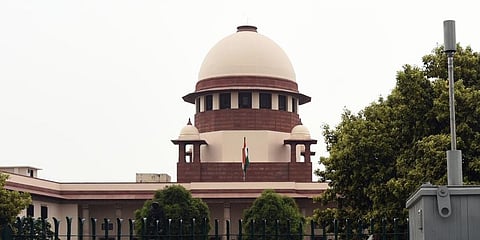

NEW DELHI: The Supreme Court on Wednesday modified one of its earlier directions and said the lawyers be allocated one mark each for a year of practice from 10 to 20 years while being considered for designation as senior advocates.
In 2017, the top court delivered a judgement laying down guidelines for itself and 24 high courts to govern the exercise of designating lawyers as seniors.
One of the guidelines provided that advocates, whose practice years are between 10 to 20 years, will be awarded 10 marks each for their experience as lawyers while being considered for designation as seniors.
A bench headed by Justice Uday Umesh Lalit found force in the submission of senior advocate Indira Jaising that instead of awarding flat 10 marks each to the lawyers having experience between 10 to 20 years, the apex court should consider granting one mark each a year of experience.
Jaising said that she has received feedback from advocates that everyone who had an experience of 10-19 years is getting the same marks and suggested that a person having 14 years of experience be given 14 marks and a person having experience of 19 years be given 19 marks to meet the ends of justice.
"We clarify the situation and hold that instead of 10 marks to be allocated to a...counsel who has put in 10-20 years of practice, marks be allocated commensurate with the standing of the person at the bar, that is to say, one mark each be allocated for every year of practice from 10-20 years. Prayer 'c' in the application is therefore granted," said the bench which also comprised Justices S Ravindra Bhat and P S Narasimha.
The bench has granted time to Solicitor General Tushar Mehta to file the response on behalf of the Centre in the matter and fixed it for a hearing on May 12.
The law officer said that conferring senior designation is an honour given by the court and it cannot be subject to personal interviews.
Earlier, the bench had agreed to consider pleas seeking to declare the process adopted by some high courts to confer 'senior designations' to advocates through the process of secret voting of the full court as 'arbitrary and discriminatory'.
One of the applications in the disposed of the matter was filed by Jaising on whose PIL the apex court had come out with a slew of guidelines for designating lawyers as seniors in 2017.
Jaising said the designation of lawyers should be based on marks given by the designated committee and the voting should be resorted to "only" when it is "unavoidable".
She said, adding that some high courts use the voting method as a norm and not an exception.
"It is a judgement (of 2017) which requires it to be worked out by the court. This issue has been hanging fire for a very long time," Jaising said.
The plea referred to the use of a secret voting process as the norm by the Delhi as well as the Punjab and Haryana high courts despite the fact that the committees, set up for this purpose, assign the marks to the lawyers based on the "objective criteria" formulated by the 2017 judgement.
In 2017, the top court had laid down guidelines for itself and 24 high courts to govern the exercise of designating lawyers as seniors.
For the apex court, it had said that a five-member permanent committee headed by the Chief Justice of India be set up for short-listing candidates for conferring senior designation.
For the apex court, it had said that a five-member permanent committee headed by the Chief Justice of India be set up for short-listing candidates for conferring senior designation.
"All matters relating to the designation of senior advocates in the Supreme Court and all the High Courts of the country shall be dealt with by a Permanent Committee to be known as 'Committee for Designation of Senior Advocates'," it had said.
The panel will be headed by the CJI and consist of two senior-most Judges of the apex court or "High Court(s), as may be," and the Attorney General or the Advocate General of a state in case of a High Court will be its member, it had said.
On giving the Bar representation, it had said "the four Members of the Permanent Committee will nominate another Member of the Bar to be the fifth member of the Permanent Committee".
"Voting by secret ballot will not normally be resorted to by the Full Court, except when unavoidable. In the event of the resort to the secret ballot, decisions will be carried by a majority of the Judges who have chosen to exercise their preference/choice," it had said.